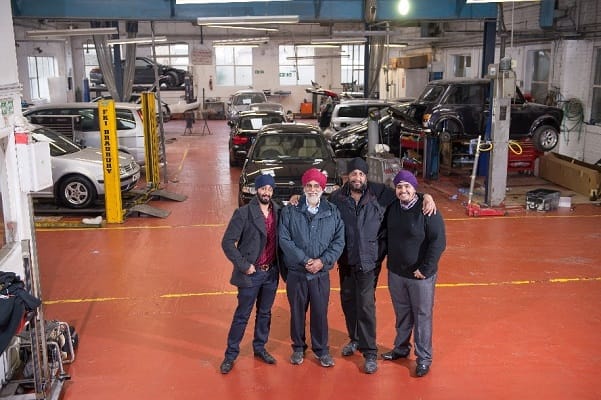How do you make a long-haul diesel truck emit 50% less CO2 without changing a single thing about it? Sounds like a riddle, right? A new pilot solution embraced by BMW Group Logistik and supplied by partner firm Trailer Dynamics here in Germany, though, can do just that. I spoke with Mo Koellner from BMW and Michael Nimtsch from Trailer Dynamics about this tech on a call earlier in the week.
As to the answer to the above riddle: This is a semi-truck trailer that has a massive battery pack (up to 600 kWh) installed in its floor, and that battery powers an electrically driven axle underneath the trailer. The solution isn’t conceptually novel; e-trailers, or electrified trailers, have been on the market in various forms for a number of years now (though the technology is still in a relative stage of infancy). The basic principle is simple, too. By adding a battery-electric driven power source to a diesel tractor-trailer, you reduce the fuel consumption of the diesel portion of the system. In other words, you’ve created a plug-in hybrid-electric big rig. Pretty straightforward, yeah?
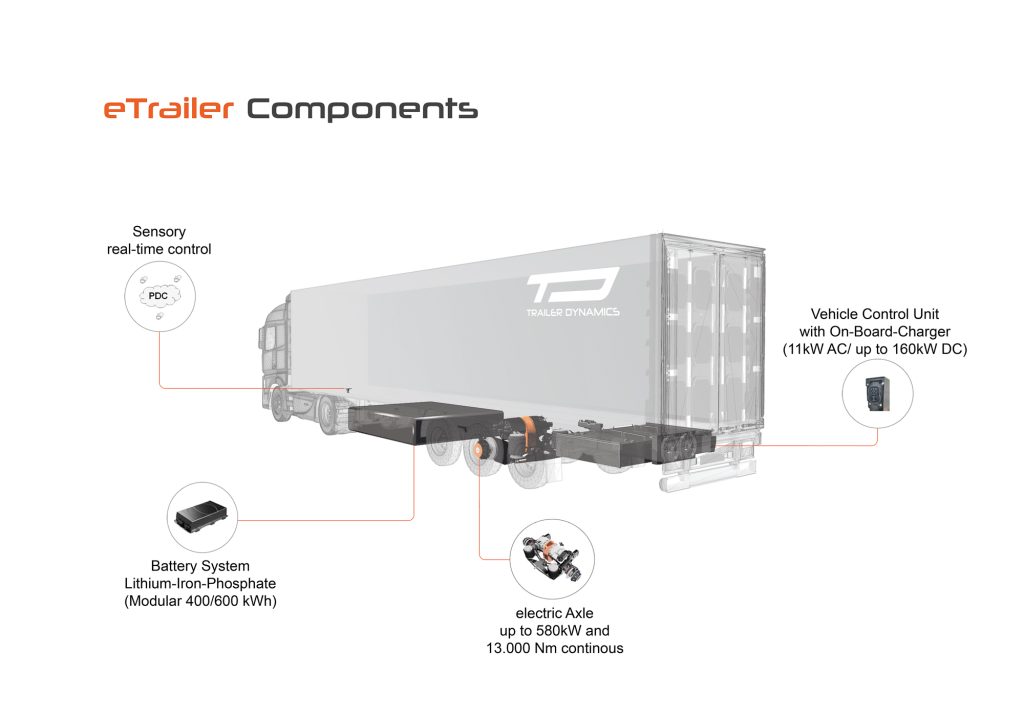
What makes Trailer Dynamics’ solution cool is just how “plug and play” it is. In fact, the company says that its electric trailers can work with any truck they are physically capable of hitching to. No trailer-to-truck connection is utilized; the e-trailer operates totally independently. Trailer Dynamics says this makes its product unique* in the space, as most other e-trailer solutions require active communication with the connected truck to enable the electric-assisted drive. BMW is currently testing TD’s solution on its BMW Group Logistik fleet. (*US-based Range Energy also claims to work with basically any truck, and their solution seems quite similar to Trailer Dynamics. We covered them back in May. The biggest distinction I’ve seen is that Trailer Dynamics offers far larger batteries. BMW’s fuel consumption figures also seem to indicate TD’s solution may be more efficient, but it’s hard to know how apples-to-apples these numbers are given the pack size differences.)
The way TD achieves this is down to a proprietary sensor pack that lives in the kingpin of the trailer. There, a computer control model takes input from the sensors (used to monitor various forces on the kingpin) and converts that data into a decision about when and how much power to apply to the electric motors in the axle. The logic of the system takes into account the sort of things you’d expect. For example, if the trailer knows the truck is currently stopped and is beginning a start — when large trucks tend to make use of their fuel most inefficiently — it will apply very substantial power to get the truck rolling. The result is a huge reduction in the amount of diesel used. Similarly, if the system detects the truck is going uphill, electric assist will be applied generously to minimize the effects of an otherwise high fuel consumption situation. According to TD’s website, factors like weather conditions, route topography, and traffic can also be considered, though it was less clear to me how these play in to when the trailer applies power. The system can also be configured to diable itself if the battery capacity reaches a predefined cutoff point (important, as fleet operators ideally want a minimum level of charge guaranteed at any moment).
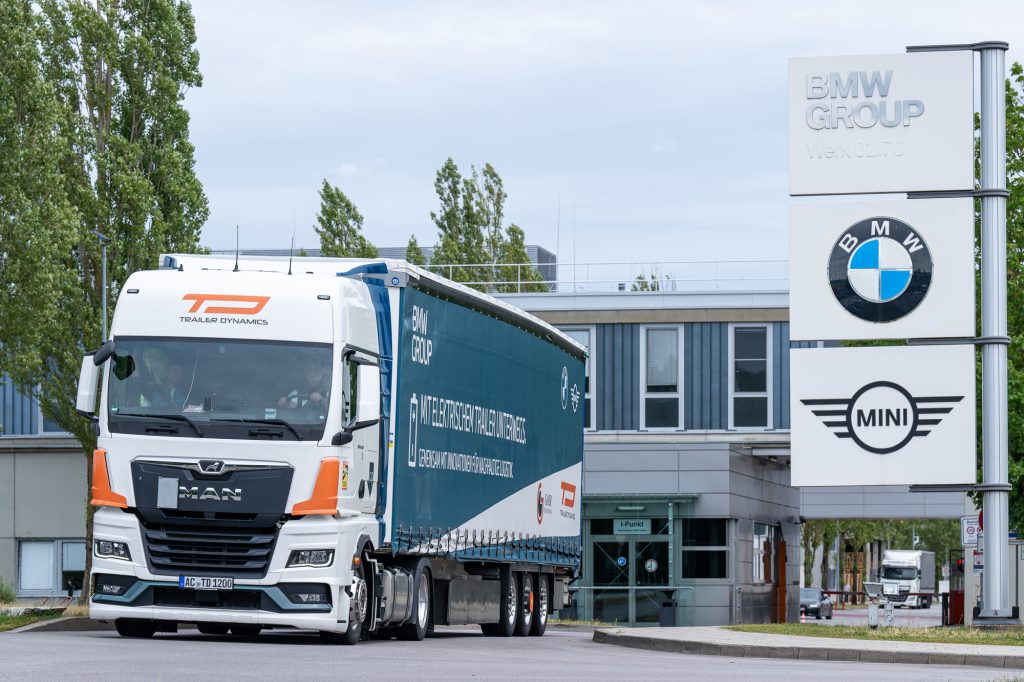
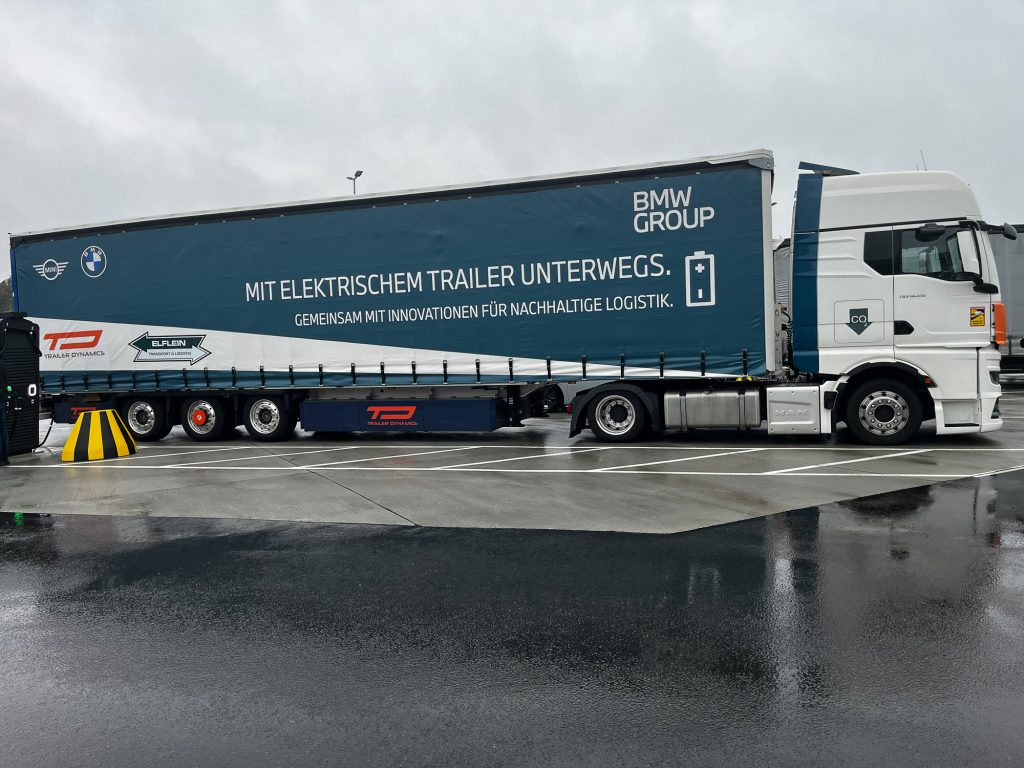
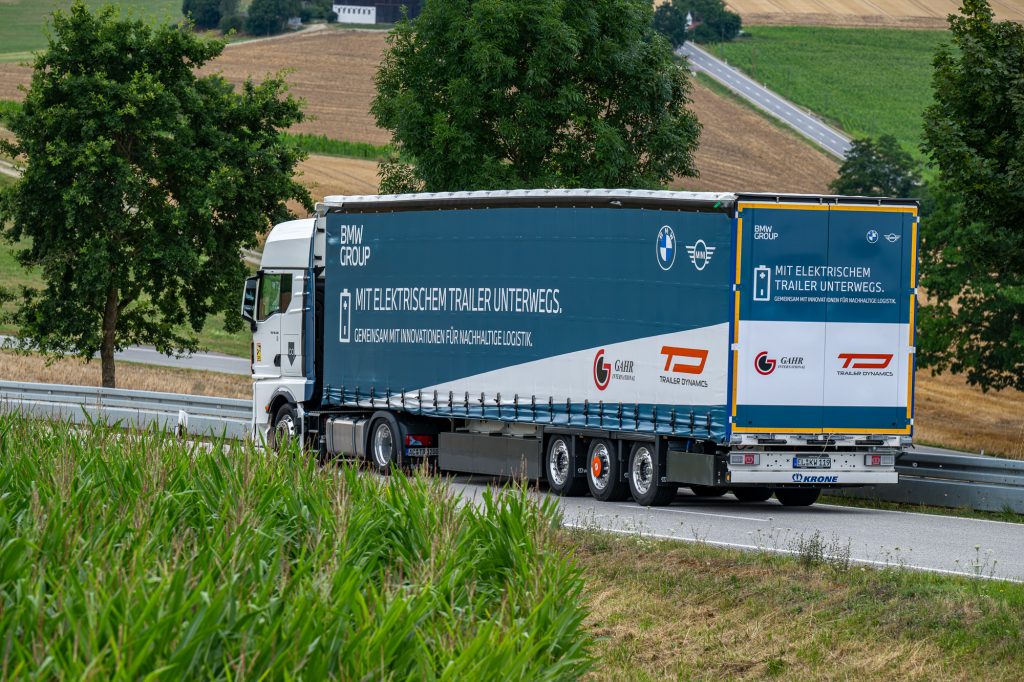
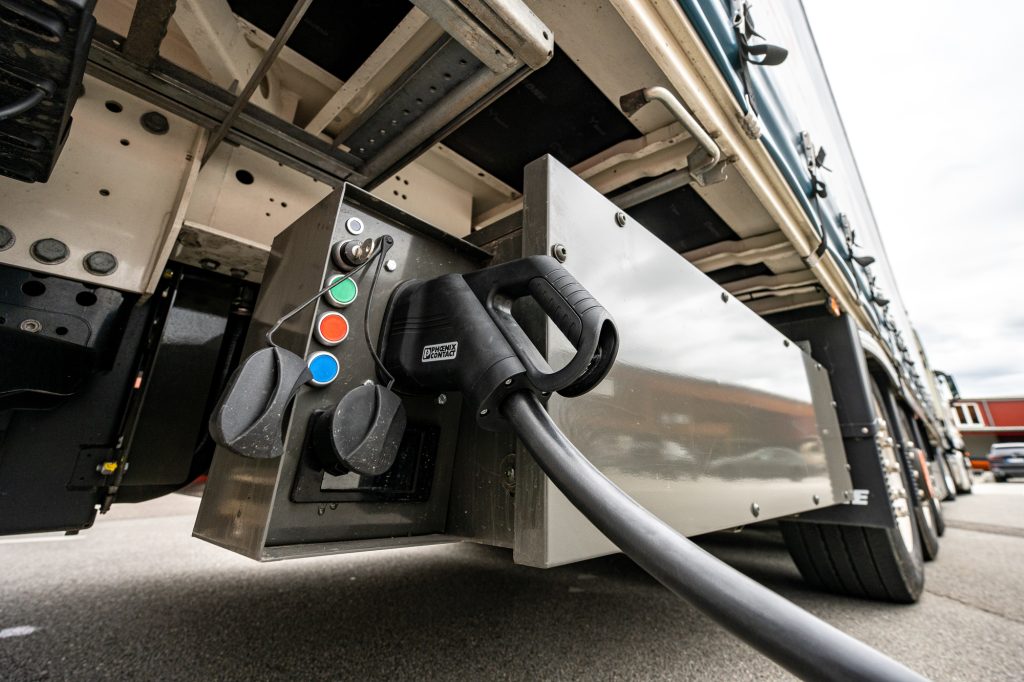
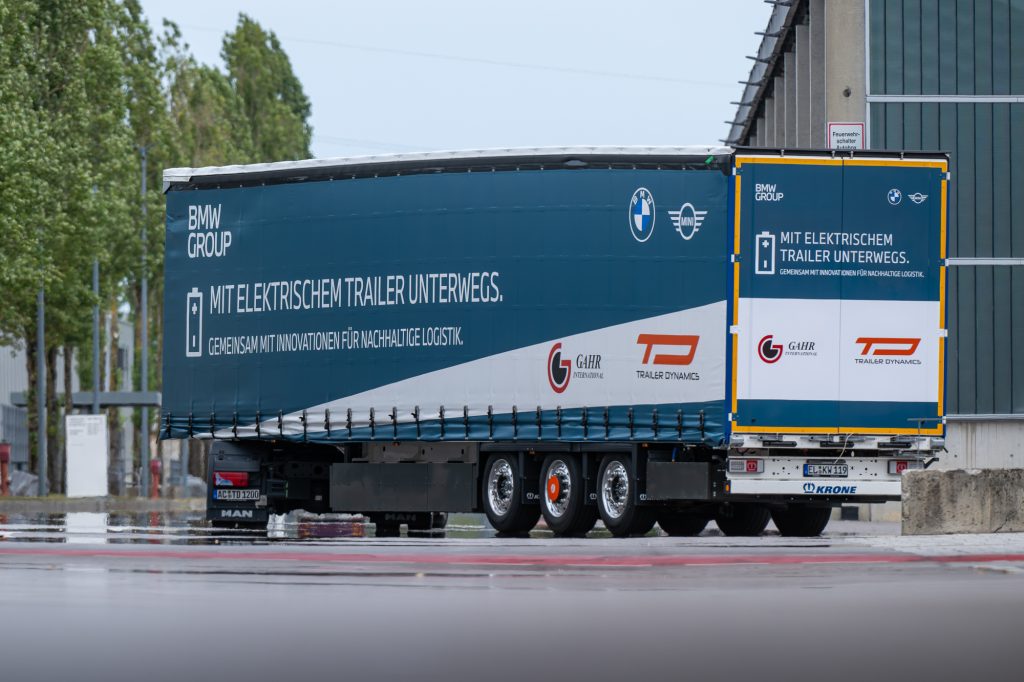
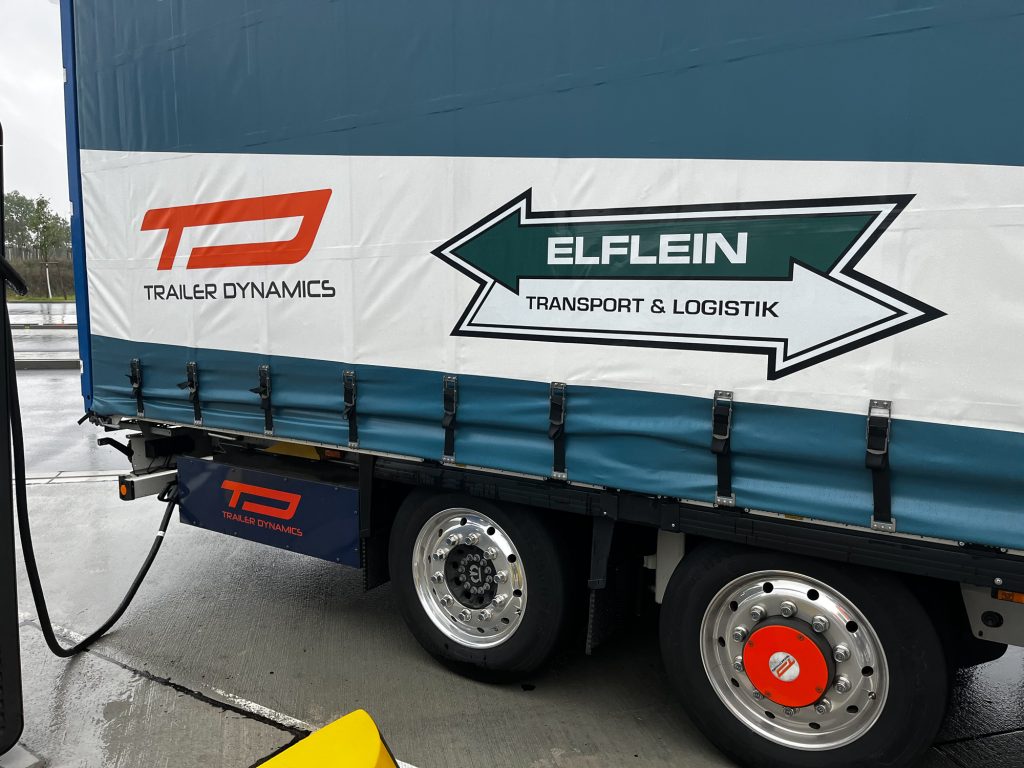
The system itself is, by the standards of passenger electric vehicles, some very heavy-duty stuff. Battery packs of either 400 kWh or 600 kWh are employed (a 200 kWh unit is coming later), with the 600 kWh configuration being the most desirable among TD’s prospective customers. That’s because the economics of efficiency apparently pay off best for longer routes, where a larger battery is going to be necessary. The electric motor unit outputs up to 580 kW (777 hp), which is impressive, but it’s the insane 13,000 nm of torque that’s doing the heavy lifting (literally). Charging is also pretty damn quick, with the 800V architecture supporting 44 kW AC and up to 350 kW DC fast charging. The supersized figures here make sense when you consider the weights at play — BMW is testing TD’s trailers with a payload of 16 metric tonnes, or over 35,000 pounds. (Specifically, BMW has been using them to haul electric drive units for its passenger cars.)
As for the end efficiency, BMW is seeing fuel consumption lowered by nearly 50% on some of the long-haul routes it’s testing, meaning emissions on those routes are cut in half. Even on shorter routes, the figure is in excess of 45% fuel savings. Because BMW is using 100% carbon-neutral sources to recharge the trailer batteries, it estimates that each e-trailer could cut up to 120 tonnes of CO2 emissions from its fleet each year. For comparison, assuming a “typical” ICE car emits around 5 tonnes of CO2 annually, each trailer optimally utilized is like taking 60 cars off the road. All that is to say: It’s hard to overstate how much fuel a real big truck uses.
BMW has also been testing TD’s trailers with electric trucks, where the system effectively acts as a range extender. Depending on the specific truck, payload, and route, BMW says the range of an electric truck could be extended by a factor of 2-3x, opening up entirely new scenarios for the use of BEV tractor units. In one test, BMW used an unspecified Volvo e-truck in combination with a TD mega trailer to go over 600 km (373 miles) without recharging.
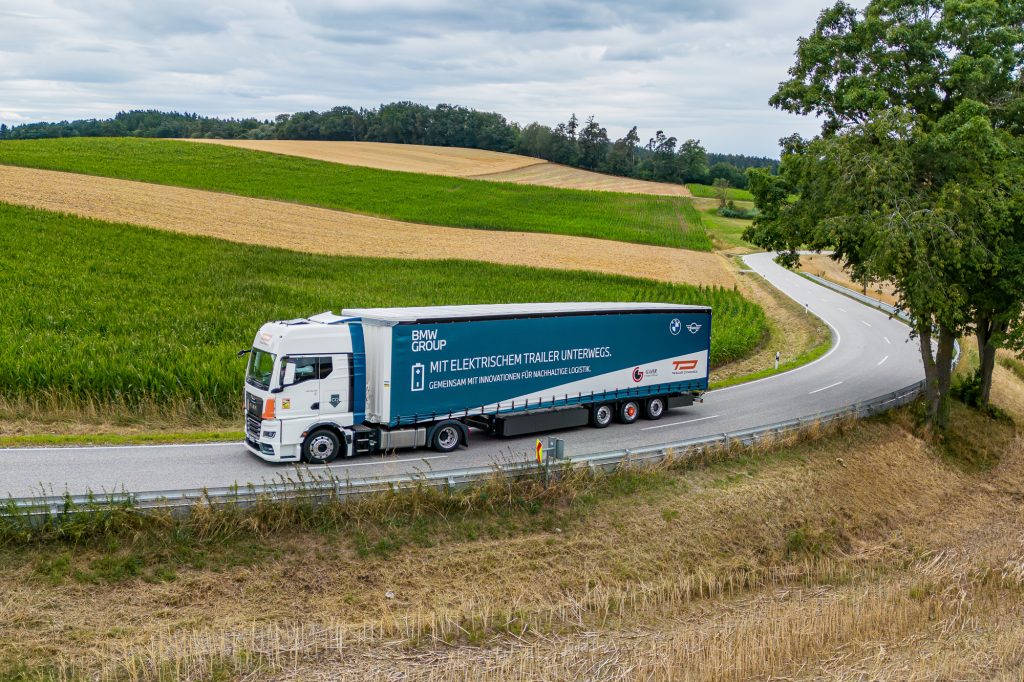
In a perfect world, diesel trucks would be replaced with electric ones wholesale. But in reality, the design principle of trucks as long-life assets means that ICE trucking will stick around a fair bit longer than combustion passenger cars. If we can reach a point where e-trailer systems like Trailer Dynamics’ are minimizing trucking fuel consumption at scale, though, we can still have a real net-positive impact on emissions while that transition occurs. And because this kind of system benefits both ICE and EV tractors (arguably, the latter even more so), this is a scenario where the hybrid step-transition makes much more sense. There’s nothing redundant being engineered here for the sake of ICE trucks; these trailers will retain their usefulness in the age of BEV trucking.
For BMW, the EV trucking side of the equation has an added bonus — the low-liner “mega trailer” configuration it uses for a large amount of its transport fleet greatly limits the range of available EV truck options. Using TD’s mega trailer solution as a range extender is thus an excellent way to work around that challenge. (Mega trailers are a high-capacity trailer class specifically developed for use in the EU, where they remain extremely popular. These space-maximized trailers require a particular class of truck chassis with a very low deck floor for towing, and that leaves very little room for a battery.)
As for the challenges of stuffing a massive battery in the bottom of an already super-heavy-laden trailer? They’re not nonexistent. According to BMW, TD’s solutions are best for shipping in “cubed out” configurations — that is, utilizing the maximum volume of a container, not its maximum weight. And sure, the battery cannibalizes some of the available space for cargo. But, over time and with the evolution and refinement of the system (weight reduction is one of TD’s immediate goals), greater and greater payloads will become feasible. Human behavior is another big factor to consider. Suppose a tractor operator is still driving like a leadfoot. In that case, it’s possible to mitigate a fair bit of the system’s fuel savings (BMW saw fuel consumption variability of up to 20% during testing based on driver). On the economics, BMW believes that e-trailers will significantly lower fleet operating costs, offsetting initially higher acquisition costs for the equipment.
Down the road, TD suggests it could also start using its tech to assist in the on-road safety of tractor-trailers, applying power or engine braking force for stability management (for example, if a truck is in danger of jackknifing). Right now, the company is just getting started, and currently has seven trailers in operation (an eighth was just delivered).
While cleaning up our passenger cars will have a real effect on global CO2 emissions, the impact of trucking transport is something we should all be considering, too. According to data from the IEA, road freight accounts for 30% of all global transportation emissions, making it the second-largest contributor behind passenger vehicles — and by a wide margin. (For comparison, all air and sea transit contribute just above 10% of global emissions each. Rail sits at a measly 1%.)
FTC: We use income earning auto affiliate links. More.








